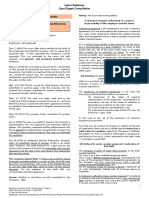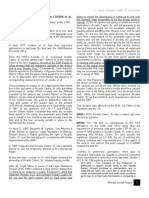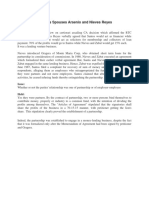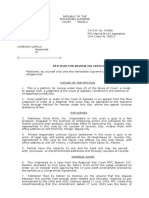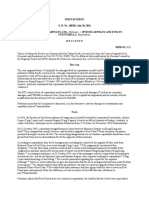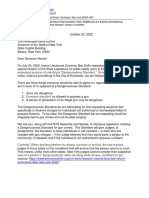0 ratings0% found this document useful (0 votes)
113 viewsImmunity From Suit: Imperium or An Equal Has No Dominion Over An Equal, Which Is The Basis of The
Immunity From Suit: Imperium or An Equal Has No Dominion Over An Equal, Which Is The Basis of The
Uploaded by
Patricia RodriguezThe document discusses immunity from suit under Philippine law. It outlines categories of persons and bodies that are immune from local jurisdiction, including foreign sovereigns and states, diplomatic agents, and international organizations. It also discusses three doctrines often applied in cases involving foreign governments: state immunity, non-justiciability, and the act of state doctrine. The document then discusses the concept of state immunity under international law and the Philippine Constitution. It provides examples of express and implied consent by the state to be sued. Finally, it briefly discusses the International Criminal Court, including its purpose, establishment via the Rome Statute, and relationship to national courts and the UN.
Copyright:
© All Rights Reserved
Available Formats
Download as DOCX, PDF, TXT or read online from Scribd
Immunity From Suit: Imperium or An Equal Has No Dominion Over An Equal, Which Is The Basis of The
Immunity From Suit: Imperium or An Equal Has No Dominion Over An Equal, Which Is The Basis of The
Uploaded by
Patricia Rodriguez0 ratings0% found this document useful (0 votes)
113 views12 pagesThe document discusses immunity from suit under Philippine law. It outlines categories of persons and bodies that are immune from local jurisdiction, including foreign sovereigns and states, diplomatic agents, and international organizations. It also discusses three doctrines often applied in cases involving foreign governments: state immunity, non-justiciability, and the act of state doctrine. The document then discusses the concept of state immunity under international law and the Philippine Constitution. It provides examples of express and implied consent by the state to be sued. Finally, it briefly discusses the International Criminal Court, including its purpose, establishment via the Rome Statute, and relationship to national courts and the UN.
Original Description:
O
Original Title
PIL-June-13-2020
Copyright
© © All Rights Reserved
Available Formats
DOCX, PDF, TXT or read online from Scribd
Share this document
Did you find this document useful?
Is this content inappropriate?
The document discusses immunity from suit under Philippine law. It outlines categories of persons and bodies that are immune from local jurisdiction, including foreign sovereigns and states, diplomatic agents, and international organizations. It also discusses three doctrines often applied in cases involving foreign governments: state immunity, non-justiciability, and the act of state doctrine. The document then discusses the concept of state immunity under international law and the Philippine Constitution. It provides examples of express and implied consent by the state to be sued. Finally, it briefly discusses the International Criminal Court, including its purpose, establishment via the Rome Statute, and relationship to national courts and the UN.
Copyright:
© All Rights Reserved
Available Formats
Download as DOCX, PDF, TXT or read online from Scribd
Download as docx, pdf, or txt
0 ratings0% found this document useful (0 votes)
113 views12 pagesImmunity From Suit: Imperium or An Equal Has No Dominion Over An Equal, Which Is The Basis of The
Immunity From Suit: Imperium or An Equal Has No Dominion Over An Equal, Which Is The Basis of The
Uploaded by
Patricia RodriguezThe document discusses immunity from suit under Philippine law. It outlines categories of persons and bodies that are immune from local jurisdiction, including foreign sovereigns and states, diplomatic agents, and international organizations. It also discusses three doctrines often applied in cases involving foreign governments: state immunity, non-justiciability, and the act of state doctrine. The document then discusses the concept of state immunity under international law and the Philippine Constitution. It provides examples of express and implied consent by the state to be sued. Finally, it briefly discusses the International Criminal Court, including its purpose, establishment via the Rome Statute, and relationship to national courts and the UN.
Copyright:
© All Rights Reserved
Available Formats
Download as DOCX, PDF, TXT or read online from Scribd
Download as docx, pdf, or txt
You are on page 1of 12
PIL (Espaldon) – June 13, 2020
IMMUNITY FROM SUIT
Categories of persons and bodies immune from local jurisdiction
- Foreign sovereigns and foreign states (i.e. State immunity)
- Diplomatic agents of a foreign State
- International organizations and their representatives
o Their immunity is not based on customary IL
o Based on the treaty creating them (Headquarters Agreement)
Example: Asian Development Bank
- Consular officers
Three doctrines often applied in cases involving foreign governments
1. A plea of State immunity
o A national court is barred from exercising its adjudicative and enforcement
jurisdiction because of the quality of the defendant, that is, because the
defendant is a foreign State or its agent.
o Sovereign equality of States
2. A plea of non-justiciability
o A municipal court has no jurisdiction because of the subject-matter of the
proceedings. This is an exercise of judicial restraint and abstention.
3. The act of State doctrine
o Courts of one country will not sit in judgment on the acts of the
government of another in due deference to the independence of
sovereignty of every sovereign state.
What is State Immunity?
A principle of IL which exempts a State from prosecution or suit for the violation of the
domestic laws of another state.
*Note: this is one of the generally accepted principles of IL that we adopted as a part of
the law of the land. One of the attributes of the state is the right of equality.
- Akin to the right of equality of state is the IL principle par in parem non habet
imperium or an equal has no dominion over an equal, which is the basis of the
doctrine of state immunity
- Under this maxim, a State cannot assume jurisdiction over a case lodged against
another State unless the latter gives consent to be sued.
Immunity under the Philippine Constitution
The State may not be sued without its consent. (Art XVI Sec. 3, 1987 Constitution)
Consent to be Sued
The Immunity of the State from Suit may be waived expressly or impliedly.
Forms of consent
1. Express consent
a. General law
o Act No. 3083 and CA 327 as amended by Secs. 49-50, PD 1445.
- Money claims arising from contracts which could serve as a
basis of civil action between private parties to be first filed
with COA before a suit may be filed in court. The COA must
act upon the claim within 60 days. Rejection of the claim
authorizes the claimant to elevate the matter to the Supreme
Court on certiorari.
o Art. 2180 NCC
- Tort committed by special agent
o Art. 2189 NCC
- LGUs liable for injuries or death caused by defective
conditions of roads or public works under their control
- (City of Manila v. Teotico, et al., GR No. L-23052)
o Sec. 22(2) RA 7160, LGC of 1991
- LGUs have power to sue and be sued
o Sec. 24 of LGC
- LGUs and their officials are not exempt from liability for
death or injury or damage to property.
o Note: the express consent of the State to be sued must be
embodied in a duly enacted statute and my not be given by a
mere counsel of the government. (Republic vs Purisima, GR No. L-
36084)
KMP members clashed with the anti-riot squad which resulted to 13 deaths and several
casualties. Thereafter, President Corazon C. Aquino, issued AO11, creating the
Citizens’ Mendiola Commission to conduct the investigation about the incident. The
commission recommended compensating the victims. The petitioners (Caylao group)
together with the military personnel involved in the Mendiola incident instituted an action
against the Republic of the Philippines before the trial court. Respondent Judge
Sandoval dismissed the complaint on the ground of State immunity from suit. Petitioners
argued that the State has impliedly waived its immunity from suit with the
recommendation of the Commission to indemnify the heirs and victims of the Mendiola
incident by the government and by the public addressed made by then President
Aquino in the aftermath of the killings. Is the argument meritorious?
NO. The actions of President Aquino cannot be deemed as a waiver of State immunity.
Whatever acts or utterances that then President Aquino may have done or said, the
same are not tantamount to the State having waived its immunity from suit. The
President’s act of joining the marchers, days after the incident, does not mean that there
was an admission by the State of any liability. Moreover, petitioners rely on President
Aquino’s speech promising that the government would address the grievances of the
rallyists. By this alone, it cannot be inferred that the State has admitted any liability,
much less can it be inferred that it has consented to the suit. (Republic vs Sandoval, GR
No. 84607)
b. Special Law
o By virtue of PD 1620, the grant of immunity to IRRI is clear and
unequivocal, and an express waiver by its Director General is the
only way by which it may relinquish or abandon this immunity.
(Callado vs IRRI, G.R. No. 106483)
2. Implied consent
a. When the State commences litigation, it becomes vulnerable to
counterclaim (Froilan v Pan Oriental Shipping, GR No. L-6060)
b. When the State enters into a business contract
c. In jure gestionis – by right of economic or business relations; commercial,
or proprietary acts. MAY BE SUED. (US vs Guinto, GR No. 76607)
o Note: The State may be said to have descended to the level of an
individual and can thus be deemed to have tacitly given its consent
to be sued only when it enters into business contracts.
Consequently, the restrictive application of State immunity is proper
only in such case. (Restrictive Theory of State immunity from suit)
d. In jure imperii – by right of sovereign power and in the exercvise of
sovereign functions. No implied consent. US vs Ruiz, GR No. L-35645)
o In exercising the power of eminent domain, the State exercises a
power jure imperii. Yet, it has been held that where property has
been taken without the payment of just compensation, the defense
of immunity from suit cannot be set up in an action for payment by
the owner (Republic vs Sandiganbayan, GR No. 90478)
A suit is considered as suit against the State when:
- The Republic is sued by name
- The suit is against an unincorporated government agency performing
governmental functions
- The suit is on its face against a government officer, but the case is such that
ultimate liability will belong to the government. (Republic vs. Sandoval, GR No.
84607)
International Criminal Court
What is the International Criminal Court?
The ICC is a permanent international court established to investigate, prosecute, and try
individuals accused of committing the most serious crimes of concern to the
international community as a whole, namely the crime of genocide, crimes against
humanity, war crimes and the crime of aggression.
What is the Rome Statute?
On July 17, 1998, a conference of 160 States established the first treaty based
permanent international criminal court. The treaty adopted during that conference is
known as the Rome Statue of the International Criminal Court. Among other things it
sets out the crimes falling within the jurisdiction of the ICC, the rules of procedure and
the mechanisms for states to cooperate with the ICC. The countries which have
accepted these rules are known as States Parties and are represented in the Assembly
of States Parties.
How does the ICC differ from other courts?
The ICC is a permanent autonomous court, whereas the ad hoc tribunals for the former
Yugoslavia and Rwanda, as well as other similar courts established within the
framework of the United Nations to deal with special situations only have a limited
mandate and jurisdiction. The ICC, which tries individuals, is also different from the
International Court of Justice, which is the principal judicial organ of the United Nations
for the settlement of disputes between States. The ad hoc tribunal for the former
Yugoslavia, and the International Court of Justice also have their seats in The Hague.
Is the ICC an office or agency of the UN
No. The ICC is an independent body whose mission is to try individuals for crimes within
its jurisdiction without the need for a special mandate from the United Nations. On
October 4, 2004, the ICC and the United Nations signed an agreement governing their
institutional relationship.
Is the ICC meant to replace national courts?
No. The ICC does not replace national criminal justice systems; rather it complements
them. It can investigate and, where warranted, prosecute and try individuals only if the
State concerned does not, cannot or is unwilling genuinely to do so. This might occur
where proceedings are unduly delayed or are intended to shield individuals from their
criminal responsibility. This is known as the principle of complementarity, under which
priority is given to national systems. States retain primary responsibility for trying the
perpetrators of the most serious of crimes.
Under what conditions does the ICC exercise its jurisdiction?
When a State becomes a party to the Rome Statute, it agrees to submit itself to the
jurisdiction of the ICC with respect to the crimes enumerated in the Statute. The Court
may exercise its jurisdiction in situations where the alleged perpetrator is a national of a
State Party. Also, a State not party to the Statute may decide to accept the jurisdiction
of the ICC. These conditions do not apply when the Security Council, acting under
Chapter VII of the United Nations Charter, refers a situation to the Office of the
Prosecutor.
Is the ICC’s jurisdiction time bound?
The ICC has jurisdiction only with respect to events after the entry into force of its
Statute on July 1, 2002. If a State becomes a party to the Statute after its entry into
force, the Court may exercise its jurisdiction only with respect to crimes committed after
the entry into force of the Statute for that State, unless that State has made a
declaration accepting the jurisdiction of the ICC retroactively. However, the Court
cannot exercise jurisdiction with respect to events which occurred before July 1, 2002.
For a new State Party, the Statute enters into force on the first day of the month after
the 60th day following the date of the deposit of its instrument of ratification, acceptance,
approval, or accession.
Who can be prosecuted before the ICC?
The ICC prosecutes individuals, not groups or States. Any individual who is alleged to
have committed crimes within the jurisdiction of the ICC may be brought before the ICC.
In fact, the Office of the Prosecutor’s prosecutorial policy is to focus on those who,
having regard to the evidence gathered, bear the greatest responsibility for the crimes,
and does not take into account any official position that may be held by the alleged
perpetrators.
Can the ICC try children?
No. The Court has no jurisdiction with respect to any person who was under the age of
18 when the crimes concerned were committed.
If those who bear greatest responsibility hold high political or military office, are they not
exempt from prosecution? Can they not be granted immunity or amnesty?
No one is exempt from prosecution because of his or her current functions or because
of the position he or she held at the time the crimes concerned were committed.
Acting as a Head of State or Government, minister or parliamentarian does not exempt
anyone from criminal responsibility before the ICC.
In some circumstances, a person in a position of authority may even be held
responsible for crimes committed by those acting under his or her command or orders.
*doctrine of command responsibility
Likewise, amnesty cannot be used as a defense before the ICC. As such, it cannot bar
the Court from exercising its jurisdiction.
What is the role of the Pre-Trial Chambers?
The Pre-Trial Chambers, each of which is composed of either one or three judges,
resolve all issues which arise before the trial phase begins. Their role is essentially to
supervise how the Office of the Prosecutor carries out its investigatory and prosecutorial
activities, to guarantee the rights of suspects, victims, witness during the investigatory
phase, and to ensure the integrity of the proceedings. The Pre-Trial Chambers then
decide whether or not to issue warrants or arrest or summons to appear at the Office of
the Prosecutor’s request and whether or not to confirm the charges against a person
suspected of a crime. They may also decide on the admissibility of situations and cases
and on the participation of victims at the pre-trial stage.
What is the role of the Trial Chambers?
Once an arrest warrant is issued, the alleged perpetrator arrested and the charges
confirmed by a Pre-Trial Chamber, the Presidency constitutes a Trial Chamber
composed of three judges to try the case.
A Trial Chamber’s primary function is to ensure that trials are fair and expeditious and
are conducted with full respect for the rights of the accused and due regard for the
protection of the victims and the witnesses. It also rules on the participation of victims at
the trial stage.
The Trial Chamber determines whether an accused is innocent or guilty of the charges
and, if he or she is found guilty, may impose a sentence of imprisonment for a specified
number of years not exceeding a maximum of thirty (30) years or life imprisonment.
Financial penalties may also be imposed. A Trial Chamber may thus order a convicted
person to make reparations for the harm suffered by the victims, including
compensation, restitution, or rehabilitation.
What are the main functions of the Appeals Chamber?
The Appeals Chamber is composed of the President of the Court and four other judges.
All parties to the trial may appeal or seek leave to appeal decisions of the Pre-Trial and
Trial Chambers. The Appeals Chamber may uphold, reverse, or amend the decision
appealed from, including judgments and sentencing decision and may even order a new
trial before a different Trial Chamber.
It may also revise a final judgment of conviction or sentence.
What does the Office of the Prosecutor do?
The Office of the Prosecutor is an independent organ of the Court. Its mandate is to
receive and analyze information on situations or alleged crimes within the jurisdiction of
the ICC, to analyze situations referred to it in order to determine whether there is a
reasonable basis to initiate an investigation into a crime of genocide, crimes against
humanity, war crimes, or the crime of aggression, and to bring the perpetrators of these
crimes before the Court.
In order to fulfill its mandate, the Office of the Prosecutor is composed of three divisions:
1. The Investigation Division, which is responsible for conducting investigations
(including gathering and examining evidence, questioning persons under
investigation as well as victims and witnesses). In this respect, for the purposes
of establishing the truth, the Statute requires the Office of the Prosecutor to
investigate incriminating and exoneration circumstances equally.
2. The Prosecution Division has a role in the investigative process, but its principal
responsibility is litigating cases before the various Chambers of the Court.
3. The Jurisdiction, Complementarity and Cooperation Division, which, with the
support of the Investigation Division, assesses information received and
situations referred to the Court, analyzes situations and cases to determine their
admissibility and helps secure the cooperation required by the Office of the
Prosecutor in order to fulfill its mandate.
Which crimes fall within the jurisdiction of the ICC?
The mandate of the Court is to try individuals (rather than States), and to hold such
persons accountable for the most serious crimes of concern to the international
community as a whole, namely the crime of genocide, war crimes, crimes against
humanity, and the crime of aggression, when the conditions for the exercise of the
Court’s jurisdiction over the latter are fulfilled.
What is genocide?
According to the Rome Statute, “genocide” means any of the following acts committed
with the intent to destroy, in whole or in part, a national, ethnical, racial, or religious
group:
- Killing members of the group
- Causing serious bodily or mental harm to members of the group
- Deliberately inflicting on the group conditions of life calculated to bring about its physical
destruction in whole or in part
- Imposing measures intended to prevent births within the group
- Forcibly transferring children of the group to another group
What are crimes against humanity?
“Crimes against humanity” include any of the following acts commited as part of a
widespread or systematic attack directed against any civilian population, with
knowledge of the attack:
- Murder - Persecution against an identifiable
- Extermination group on political, racial, national,
- Enslavement ethnic, cultural, religious, or gender
- Deportation or forcible transfer of grounds
population - Enforced disappearance of persons
- Imprisonment - The crime of apartheid
- Torture - Other inhumane acts of a similar
- Rape, sexual slavery, enforced character intentionally causing great
prostitution, forced pregnancy, enforced sufferring
sterilization - Serious bodily or mental injury
- Or any other form of sexual violence of
comparable gravity
What are war crimes?
“War crimes” include grave breaches of the Geneva Conventions and other serious
violations of the laws and customs applicable in international armed conflict and in
conflicts “not of an international character” listed in the Rome Statute, when they are
committed as part of a plan or policy or on a large scale. These prohibited acts include:
- Murder
- Mutilation, cruel treatment, and torture
- Taking of hostages
- Intentionally directing attacks against the civilian population
- Intentionally directing attacks against buildings dedicated to religion, education, art, science or
charitable purposes, historical monuments or hospitals
- Pillaging
- Rape, sexual slavery, forced pregnancy, or any other form of sexual violence
- Conscripting or enlisting children under the age of 15 years into armed forces or groups or using
them to participate actively in hostilities
What is a crime of aggression?
A “crime of aggression” means the planning, preparation, initiation or execution of an
act of using armed force by a State against the sovereignty, territorial integrity or
political independence of another State.
The act of aggression includes, among other things, invasion, military occupation, and
annexation by the use of force, blockade of the ports or coasts, if it is considered being,
by its character, gravity, and scale, a manifest violation of the Charter of the United
Nations.
The perpetrator of the act of aggression is a person who is in a position effectively to
exercise control over or to direct the political or military action of a State.
How do cases come before the Court?
Any State Party to the Rome Statute can request the Office of the Prosecutor to carry
out an investigation. A State not party to the Statute can also accept the jurisdiction of
the ICC with respect to crimes committed in its territory or by one of its nationals, and
request the Office of the Prosecutor to carry out an investigation. The United Nations
Security Council may also refer a situation to the Court.
Can the Prosecutor decide on his own initiative to open an investigation?
Yes, if the Office of the Prosecutor receives reliable information about crimes involving
nationals of a State Party or of a State which has accepted the jurisdiction of the ICC, or
about crimes committed in the territory of such a State, and concludes that there is a
reasonable basis to proceed with an investigation. Such information can be provided by
individuals, intergovernmental or non-governmental organizations, or any other reliable
sources. The Prosecution must, however, obtain permission from the Pre-Trial Chamber
judges before initiating an investigation under such circumstances.
What happens when a situation is referred to the ICC for investigation?
The Prosecutor determines whether, in his or her opinion, the Court has jurisdiction with
respect to the alleged crimes. Following a thorough analysis of the available
information, the Prosecution decides whether there is a reasonable basis to proceed
with an investigation. Thus, it may establish whether the crime of genocide, cirmes
against humanity, or war crimes may have been committed and, if so, whether they
were committed after July 1, 2002. The Prosecution must also ascertain whether any
national authorities are conducting a genuine investigation or trial of the alleged
perpetrators of the crimes. Lastly, it must notify the States Parties and other States
which may have jurisdiction of its intention to initiate an investigation.
How is an investigation conducted?
The Office of the Prosecutor sends its investigators to collect evidence in areas where
crimes are alleged to have been committed. The investigators must be careful not to
create any risk to the victims and witnesses. The Office of the Prosecutor also requests
the cooperation and assistance of States and international organizations. The
investigators look for evidence of a suspect’s guilt or innocence.
Will the ICC prosecute all persons suspected of committing the most serious crimes?
No. The Court will not be able to bring to justice every person suspected of committing
crimes of concern to the international community. The prosecutorial policy of the Office
of the Prosecutor is to focus its investigation and prosecutions on those who, having
regard to the evidence gathered, bear the greatest responsibility for such crimes.
Can other courts try the perpetrators that the ICC does not prosecute?
Under the principle of complementarity, national judicial systems retain their
responsibility for trying perpetrators of crimes.
Who has the power to issue a warrant of arrest or a summons to appear?
After the initiation of an investigation, only a Pre-Trial Chamber may, at the request of
the Prosecution, issue a warrant of arrest or summons to appear if there are reasonable
grounds to believe that the person concerned has committed a crime within the ICC’s
jurisdiction.
What reasons may justify the issuing of a warrant of arrest?
The judges will issue a warrant of arrest if it appears necessary to ensure that the
person will actually appear at trial, that he or she will not obstruct or endanger the
investigation or the Court’s proceedings, or to prevent the person from continuing to
commit crimes.
What happens after a warrant of arrest is issued?
The Registrar transmits requests for cooperation seeking the arrest and surrender of the
suspect to the relevant State or to other States, depending on the decision of the judges
in each case.
Once the person is arrested and the Court is so informed, the Court ensures that the
person receives a copy of the warrant of arrest in a language which he or she fully
understands and speaks.
Does the ICC have the power to arrest suspects?
The Court does not have its own police force. Accordingly, it relies on State
cooperation, which is essential to the arrest and surrender of suspects.
According to the Rome Statute, States Parties shall cooperate fully with the Court in its
investigation and prosecution of crimes within the jurisdiction of the Court.
Who has to execute the warrants of arrest?
The responsibility to enforce warrants of arrest in all cases remains with States. In
establishing the ICC, the States set up a system based on two pillars. The Court itself is
the judicial pillar. The operational pillar belongs to States, including the enforcement of
the Court’s orders.
States Parties to the Rome Statute have a legal obligation to cooperate fully with the
ICC. When a State Party fails to comply with a request to cooperate, the Court may
make a finding to that effect and refer the matter for further action to the Assembly of
States Parties.
When the Court’s jurisdiction is triggered by the Security Council, the duty to cooperate
extends to all UN Member States, regardless of whether or not they are a Party to the
Statute. The crimes within the jurisdiction of the Court are the graves crimes known to
humanity and as provided for by Article 29 of the Statute they shall not be subject to any
statute of limitations. Warrants of arrest are lifetime orders and therefore individuals still
at large will sooner or later face the Court.
You might also like
- Lampros v. CombsDocument22 pagesLampros v. CombsBillboard100% (2)
- Dubai Law No.1 of 1971 Contracts LawDocument27 pagesDubai Law No.1 of 1971 Contracts Law徐金旭No ratings yet
- Discover English 4 Student S BookDocument82 pagesDiscover English 4 Student S BookAna Buttercup100% (1)
- 313 Wellex V Sandiganbayan - ENRIQUEZDocument2 pages313 Wellex V Sandiganbayan - ENRIQUEZCedric Enriquez100% (1)
- CRJU 160 EssayDocument4 pagesCRJU 160 EssayKayla MarieNo ratings yet
- PNRvKanlaon and Casimiro V TandogDocument5 pagesPNRvKanlaon and Casimiro V TandogJasper AlonNo ratings yet
- 137-National Semiconductor HK DistributionDocument6 pages137-National Semiconductor HK DistributionChristine Gel MadrilejoNo ratings yet
- People v. Nitafan, 207 SCRA 726Document2 pagesPeople v. Nitafan, 207 SCRA 726Ron Jacob AlmaizNo ratings yet
- Sesbreno v. Court of Appeals: JuristDocument4 pagesSesbreno v. Court of Appeals: JuristSean Denzel OmliNo ratings yet
- Manzilla vs. WaterfieldsDocument1 pageManzilla vs. WaterfieldsRommel Mancenido LagumenNo ratings yet
- Arellano University Employees and Workers Union, Et Al vs. Court of Appeals, 502 SCRA 219 (2006)Document2 pagesArellano University Employees and Workers Union, Et Al vs. Court of Appeals, 502 SCRA 219 (2006)Lu CasNo ratings yet
- Ormoc Sugarcane Planters' Association, Inc. vs. Court of Appeals, 596 SCRA 630Document6 pagesOrmoc Sugarcane Planters' Association, Inc. vs. Court of Appeals, 596 SCRA 630DNAANo ratings yet
- Patrimonio V GutierrezDocument27 pagesPatrimonio V GutierrezHeidiNo ratings yet
- Heirs of Fausta Dimaculangan Vs Intermediate Appellate Court (IAC)Document4 pagesHeirs of Fausta Dimaculangan Vs Intermediate Appellate Court (IAC)rodel talabaNo ratings yet
- Case Name: John Dy v. People of The Philipines GR No. 158312 Date: November 14, 2008 By: Ruby U. Santillana Topic: Completion of BlanksDocument2 pagesCase Name: John Dy v. People of The Philipines GR No. 158312 Date: November 14, 2008 By: Ruby U. Santillana Topic: Completion of BlanksgiovanniNo ratings yet
- Facts:: San Miguel Foods, Inc.-Cebu B-Meg Feed Plant v. LaguesmaDocument1 pageFacts:: San Miguel Foods, Inc.-Cebu B-Meg Feed Plant v. LaguesmaCuddlyNo ratings yet
- Revised HR CasesDocument27 pagesRevised HR Caseschikay100% (1)
- Schulze vs. Tullet Prebon PDFDocument25 pagesSchulze vs. Tullet Prebon PDFFatzie MendozaNo ratings yet
- Answer To Quiz No 3Document5 pagesAnswer To Quiz No 3Your Public ProfileNo ratings yet
- Ladia Notes (Revised)Document235 pagesLadia Notes (Revised)M VillarNo ratings yet
- Case Name Topic Case No. - Date Ponente Petitioner: Union Bank vs. CADocument2 pagesCase Name Topic Case No. - Date Ponente Petitioner: Union Bank vs. CAMartin PagtanacNo ratings yet
- Big Country V CADocument8 pagesBig Country V CARelmie TaasanNo ratings yet
- White Light Vs Manila and Meralco Vs SPS RamosDocument5 pagesWhite Light Vs Manila and Meralco Vs SPS RamosRona BagusNo ratings yet
- 8 Labrel-DigestDocument27 pages8 Labrel-DigestG Ant MgdNo ratings yet
- in Re Szatrow, G.R. No. L-1780, August 31,1948 (49 OG 243)Document2 pagesin Re Szatrow, G.R. No. L-1780, August 31,1948 (49 OG 243)Lester AgoncilloNo ratings yet
- Final Digest - BPI Vs CADocument1 pageFinal Digest - BPI Vs CARengie GaloNo ratings yet
- Salas V CADocument2 pagesSalas V CALouNo ratings yet
- Labor Rel Cases and Digest 2nd BatchDocument3 pagesLabor Rel Cases and Digest 2nd BatchJohn Paul Pagala AbatNo ratings yet
- LTD Part 9, 13, 16, 17 Digest - Format2Document16 pagesLTD Part 9, 13, 16, 17 Digest - Format2JacobNo ratings yet
- C3I - 1people v. DiopitaDocument2 pagesC3I - 1people v. DiopitaAaron AristonNo ratings yet
- Heirs of Arcadio Castro, Sr. vs. LozadaDocument3 pagesHeirs of Arcadio Castro, Sr. vs. LozadaMichael JosephNo ratings yet
- General ProvisionsDocument47 pagesGeneral ProvisionsTricia SibalNo ratings yet
- Triple Eight Integrated Service Inc. vs. NLRC (G.R. No. 129584 December 3, 1998) - 7Document8 pagesTriple Eight Integrated Service Inc. vs. NLRC (G.R. No. 129584 December 3, 1998) - 7Amir Nazri KaibingNo ratings yet
- Maravilla vs. RiosDocument7 pagesMaravilla vs. RiosJohn AguirreNo ratings yet
- Cases On Preliminary AttachementDocument24 pagesCases On Preliminary AttachementJohn Edward Marinas GarciaNo ratings yet
- Facts: Ong Chi, Doing Business Under The Firm Name "Tableria de Luxe Sued Francisco Reyes, JRDocument6 pagesFacts: Ong Chi, Doing Business Under The Firm Name "Tableria de Luxe Sued Francisco Reyes, JRburnboneNo ratings yet
- Fernando Santos V Spouses Arsenio and Nieves ReyesDocument1 pageFernando Santos V Spouses Arsenio and Nieves ReyesTricia SibalNo ratings yet
- Pal Vs PaleaDocument1 pagePal Vs PaleaChrysta FragataNo ratings yet
- Volkschel Labor Union Vs NLRCDocument2 pagesVolkschel Labor Union Vs NLRCCrizedhen VardeleonNo ratings yet
- Injunction FinalDocument157 pagesInjunction FinalABKeeNo ratings yet
- CBADocument10 pagesCBAGillian Caye Geniza BrionesNo ratings yet
- Alcuaz vs. Psba 161 Scra 7Document7 pagesAlcuaz vs. Psba 161 Scra 7Hanelizan Ert RoadNo ratings yet
- Human Rights Case AssignmentDocument2 pagesHuman Rights Case AssignmentAnna Liza BurceNo ratings yet
- Labor Standard Digest - Leyte GeothermalDocument2 pagesLabor Standard Digest - Leyte GeothermalCharlie Mejos MercedNo ratings yet
- Guidote vs. Borja - 53 Phil 900 - G.R. No. L-28920 - October 24, 1928Document4 pagesGuidote vs. Borja - 53 Phil 900 - G.R. No. L-28920 - October 24, 1928Ma AleNo ratings yet
- Caltex Filman Vs CIRDocument2 pagesCaltex Filman Vs CIRDang Joves BojaNo ratings yet
- DONE Manggagawa NG Komunikasyon Sa Pilipinas vs. Philippine Long Distance Telephone Company, Incorporated. G.R. No. 190390, April 19, 2017Document2 pagesDONE Manggagawa NG Komunikasyon Sa Pilipinas vs. Philippine Long Distance Telephone Company, Incorporated. G.R. No. 190390, April 19, 2017Kathlene JaoNo ratings yet
- En Banc Commissioner of Internal Revenue v. Northern Tobacco Redrying Co., Inc.Document11 pagesEn Banc Commissioner of Internal Revenue v. Northern Tobacco Redrying Co., Inc.Vince Lupango (imistervince)No ratings yet
- Grandteq Industrial Steel Products vs. Edna MargalloDocument9 pagesGrandteq Industrial Steel Products vs. Edna MargalloaudreyNo ratings yet
- Pollo Vs DavidDocument4 pagesPollo Vs DavidIrish Asilo PinedaNo ratings yet
- Saludo V PNB Case DigestDocument2 pagesSaludo V PNB Case DigestReemNo ratings yet
- 3-Body PartDocument14 pages3-Body PartChriszel Ann I. QueñanoNo ratings yet
- Arellano UniversityDocument3 pagesArellano UniversityLsly C WngNo ratings yet
- Holy Cross of Davao College, Inc. vs. JoaquinDocument9 pagesHoly Cross of Davao College, Inc. vs. Joaquin유니스No ratings yet
- International Shoe Co v. WashingtonDocument6 pagesInternational Shoe Co v. WashingtonGerasimos ManentisNo ratings yet
- G.R. No. L-87672 Wise Vs WiseDocument2 pagesG.R. No. L-87672 Wise Vs WiseBreth1979No ratings yet
- Pascual v. de La Cruz, 28 SCRA 421Document2 pagesPascual v. de La Cruz, 28 SCRA 421marco bugayongNo ratings yet
- NASECO Vs NLRCDocument1 pageNASECO Vs NLRCCeresjudicataNo ratings yet
- Conflicts Case Digest 9th SetDocument6 pagesConflicts Case Digest 9th SetJoedhel ApostolNo ratings yet
- My Oasis - Self-Made Reviewer On Obligation and ContractsDocument22 pagesMy Oasis - Self-Made Reviewer On Obligation and ContractsMarielJoYNo ratings yet
- Citibank v. Chua PDFDocument3 pagesCitibank v. Chua PDFKara SolidumNo ratings yet
- 124510-1998-Manila Central Line Corp. v. Manila CentralDocument10 pages124510-1998-Manila Central Line Corp. v. Manila CentralCesca Marcelli BalasbasNo ratings yet
- State Immunity From SuitDocument18 pagesState Immunity From SuitNufa AlyhaNo ratings yet
- Picart v. SmithDocument2 pagesPicart v. SmithPatricia RodriguezNo ratings yet
- Republic v. Meralco. in This Case, Meralco Was Seeking For Adjustments On The Charges. AngDocument2 pagesRepublic v. Meralco. in This Case, Meralco Was Seeking For Adjustments On The Charges. AngPatricia RodriguezNo ratings yet
- Saudia v. RebesencioDocument2 pagesSaudia v. RebesencioPatricia RodriguezNo ratings yet
- Pacis V MoralesDocument2 pagesPacis V MoralesPatricia RodriguezNo ratings yet
- Other Forms of ADRDocument11 pagesOther Forms of ADRPatricia RodriguezNo ratings yet
- Transpo Case Digests, 2 Batch, 2EDocument191 pagesTranspo Case Digests, 2 Batch, 2EPatricia RodriguezNo ratings yet
- 3D1819 PALE Notes and Reviewer IDocument13 pages3D1819 PALE Notes and Reviewer IPatricia RodriguezNo ratings yet
- Group 2 Law On Public Officers F HDocument59 pagesGroup 2 Law On Public Officers F HPatricia RodriguezNo ratings yet
- PIL DigestDocument44 pagesPIL DigestPatricia RodriguezNo ratings yet
- Civil LiabilityDocument10 pagesCivil LiabilityPatricia RodriguezNo ratings yet
- Sugarcane Tenancy Contracts Act of 1933 PDFDocument1 pageSugarcane Tenancy Contracts Act of 1933 PDFPatricia RodriguezNo ratings yet
- Admin HWDocument11 pagesAdmin HWPatricia RodriguezNo ratings yet
- Actions & Damages in Case of BreachDocument80 pagesActions & Damages in Case of BreachPatricia RodriguezNo ratings yet
- 6 - Far East Bank and Trust Company - CastilloDocument2 pages6 - Far East Bank and Trust Company - CastilloPatricia RodriguezNo ratings yet
- Price, I. Matzdorf, F. Smith, L. Agahi, HDocument1 pagePrice, I. Matzdorf, F. Smith, L. Agahi, HPatricia RodriguezNo ratings yet
- R V Brown Case 1994 2 FinalDocument31 pagesR V Brown Case 1994 2 Finalmuhammadmunir5406No ratings yet
- Letter To Gov. HochulDocument3 pagesLetter To Gov. HochulNews 8 WROCNo ratings yet
- Cases of Voluntary SurrenderDocument7 pagesCases of Voluntary SurrenderJOHN ERASMUS ZAGALANo ratings yet
- Peace Education (2) 1Document20 pagesPeace Education (2) 1marloulelanse5No ratings yet
- Fruits From A Poisonous TreeDocument285 pagesFruits From A Poisonous Treemlo356100% (1)
- Attempt To Murder in ZambiaDocument4 pagesAttempt To Murder in ZambiaISAAC MUSEKA LUPUPANo ratings yet
- The Migrant's Story: © David Ripley, Inthinking WWW - Englishb-Inthinking - Co.ukDocument4 pagesThe Migrant's Story: © David Ripley, Inthinking WWW - Englishb-Inthinking - Co.uk멜로스No ratings yet
- Fraud Triangle Cressey'sDocument4 pagesFraud Triangle Cressey'sleviathanzerowateNo ratings yet
- Protecting Electronic Money From Money Laundering in AlgeriaDocument17 pagesProtecting Electronic Money From Money Laundering in Algeriajournal of legal and economic research100% (1)
- Armaan Agarwal 2223110 IDCDocument6 pagesArmaan Agarwal 2223110 IDCArmaan AgarwalNo ratings yet
- Kapur Singh Vs State of Pepsu Case Summary (1956 S+Document3 pagesKapur Singh Vs State of Pepsu Case Summary (1956 S+raghavmayank886No ratings yet
- Judgment Sheet in The Lahore High Court, LahoreDocument8 pagesJudgment Sheet in The Lahore High Court, LahoreFarwan AkhtarNo ratings yet
- CECC Staff ReportDocument26 pagesCECC Staff ReportMauraNo ratings yet
- Panfilo M. Lacson vs. The Executive SecretaryDocument1 pagePanfilo M. Lacson vs. The Executive SecretaryDerek C. EgallaNo ratings yet
- Revised Penal Code Book 1 by ReyesDocument941 pagesRevised Penal Code Book 1 by ReyesErickaMae CleofeNo ratings yet
- Moot Proposition - 9th Zenith Internal Moot Court Competition 2024Document4 pagesMoot Proposition - 9th Zenith Internal Moot Court Competition 2024Suryansh ModiNo ratings yet
- Lea QnADocument29 pagesLea QnAjeysonmacaraigNo ratings yet
- People vs. BragaesDocument3 pagesPeople vs. BragaesEicee RosalesNo ratings yet
- CSOP PresentationDocument52 pagesCSOP PresentationJun Mark BascoNo ratings yet
- 10.lamb To The Slaughter - Lesson - AnthologyDocument20 pages10.lamb To The Slaughter - Lesson - AnthologyEhsanul BariNo ratings yet
- Case Digest Art 12-15Document23 pagesCase Digest Art 12-15Ruby BucitaNo ratings yet
- New Paltz Gunman Parole Hearing 02.17.21 RedactedDocument27 pagesNew Paltz Gunman Parole Hearing 02.17.21 RedactedDaily FreemanNo ratings yet
- G.R. No. 116239Document16 pagesG.R. No. 116239Alyssa Mari ReyesNo ratings yet
- People V GarilloDocument11 pagesPeople V GarilloJan Mark WongNo ratings yet
- Test Bank For Fundamentals of Research in Criminology and Criminal Justice Third EditionDocument10 pagesTest Bank For Fundamentals of Research in Criminology and Criminal Justice Third EditionfrederickmarcusrxbsrNo ratings yet
- Criminal LawDocument6 pagesCriminal LawJoe SolimanNo ratings yet
- Crime, Irregular Warfare, and Institutional Failure in Latin AmericaDocument21 pagesCrime, Irregular Warfare, and Institutional Failure in Latin AmericatamxtrastuffNo ratings yet























